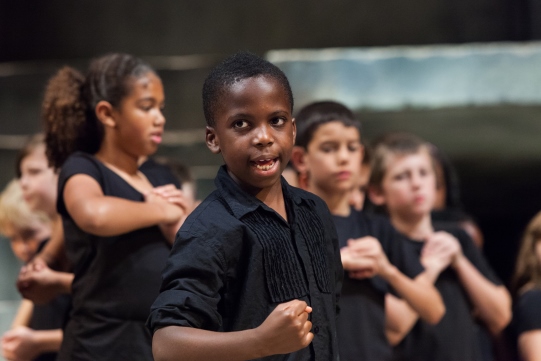
Children performing as part of the RSC’s Regional Schools Celebration
Photo: Stewart Hemley
Anniversary drive to transform the teaching of Shakespeare
New support and resources for teachers are part of a six-year initiative aiming to inspire a generation of young people through a new approach to teaching Shakespeare.
An initiative aimed at transforming students’ experiences of Shakespeare in school and giving them unprecedented access to every one of his plays is being launched to coincide with Government plans for all state educated children to study a minimum of two Shakespeare plays between the ages of 11 and 14. Young Shakespeare Nation, a scheme being driven by RSC Education and the Prince’s Foundation for Children and the Arts, has been developed in response to the RSC’s commitment to stage each of the 36 plays in the First Folio between now and 2019 in celebration of the 450th anniversary of Shakespeare’s birth in 2014 and the 400th anniversary of his death in 2016. Schools will be able to get involved in the six-year project in various ways, including free performances streamed live into classrooms, starting in November; online resources, ideas and opportunities to link with the opening of each play on the RSC’s stage; opportunities for 8-13 year olds to see Shakespeare’s plays in performance on tour and in Stratford-upon-Avon; and professional development for teachers delivered at schools across the UK.
Research conducted by the University of Warwick on behalf of the RSC has shown that using RSC Education’s methods for teaching Shakespeare significantly improves pupils’ attitudes to school and learning in general, as well as to Shakespeare. Teachers report improved self-esteem amongst students and a greater belief in their own abilities. Jacqui O’Hanlon, the RSC’s Director of Education, said: “We shouldn’t shy away from the fact that Shakespeare is challenging and that his work requires specific kinds of effort to unlock its meaning… Young Shakespeare Nation is our response to a feeling that teachers are wrestling with a new curriculum that prescribes an increase in the amount of Shakespeare that young people have to study. As the new curriculum takes hold, we want to support and work with teachers to meet this challenge, ultimately making a difference to the way young people first encounter Shakespeare in school.”
Join the Discussion
You must be logged in to post a comment.